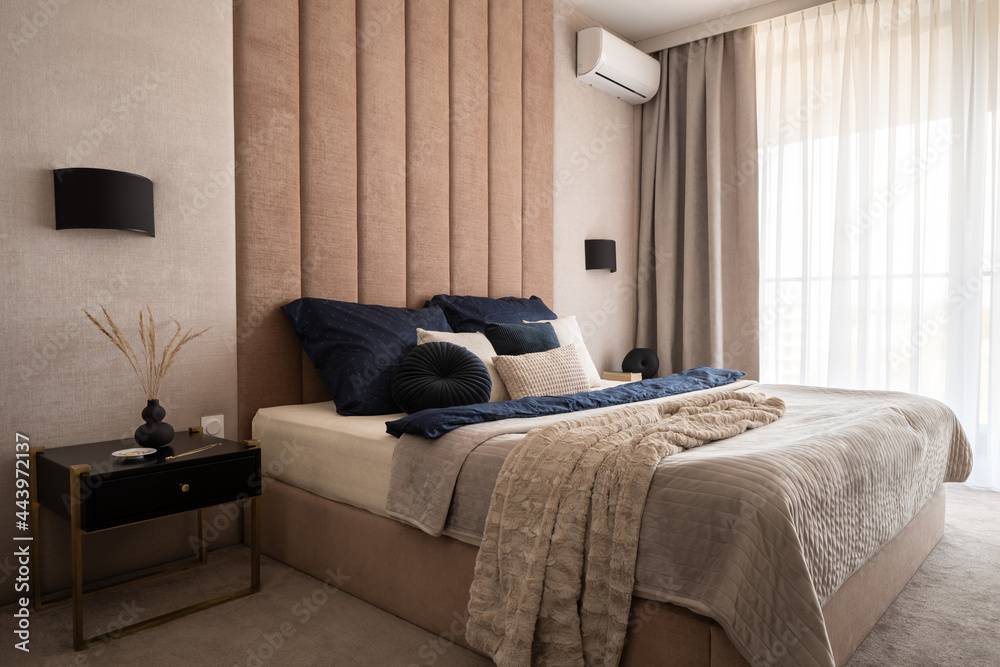- 166 Geary Street, Suite 1500 #1003, San Francisco, CA 94108
- (415) 636-9700
- [email protected]

Sleep plays a crucial role in maintaining overall health and well-being, and it is especially important for individuals with ADHD. In this section, we will discuss the significance of sleep for individuals with ADHD and explore the connection between ADHD and sleep problems.
Adequate sleep is vital for individuals with ADHD as it supports optimal cognitive functioning, emotional regulation, and behavioral control. Sufficient and restorative sleep promotes attention, concentration, and memory, which are areas of difficulty for individuals with ADHD. Quality sleep also contributes to mood stability and overall mental health, allowing individuals to manage their symptoms and challenges better.
Research has shown a strong association between ADHD and sleep problems. Individuals with ADHD often experience difficulties falling asleep, staying asleep, and maintaining a regular sleep-wake schedule. They may also have shorter sleep durations and poorer sleep quality than individuals without ADHD. The relationship between ADHD and sleep problems is complex and bidirectional, with ADHD symptoms disrupting sleep patterns and sleep problems exacerbating ADHD symptoms.

Sleep problems are commonly associated with ADHD, and it is crucial to understand the various aspects involved. Here, we delve into the common sleep difficulties experienced by individuals with ADHD, the impact of ADHD symptoms on sleep quality, and the potential underlying factors contributing to sleep problems.
Individuals with ADHD often experience a range of sleep difficulties. These may include difficulties falling asleep, staying asleep throughout the night, and experiencing restless or disrupted sleep. Additionally, they may exhibit irregular sleep-wake patterns, such as inconsistent bedtimes and wake-up times.
ADHD symptoms can significantly impact sleep quality. Hyperactivity and restlessness can make it challenging to wind down and relax before bedtime. Inattention and racing thoughts may cause difficulty quieting the mind, leading to delayed sleep onset. Moreover, impulsivity and difficulty in self-regulating behavior can disrupt sleep routines and contribute to erratic sleep patterns.
Several underlying factors may contribute to sleep problems in individuals with ADHD. These include heightened sensory sensitivity, co-occurring conditions like anxiety or depression, circadian rhythm disruptions, and medication effects. Addressing these underlying factors is crucial for effectively managing sleep difficulties in individuals with ADHD.

ADHD and sleep problems have a complex and bidirectional relationship. The symptoms of ADHD can disrupt sleep patterns, while sleep problems can exacerbate ADHD symptoms. Additionally, sleep deprivation can have a significant impact on cognitive functioning. Let’s explore these aspects further.
The core symptoms of ADHD, such as hyperactivity, impulsivity, and racing thoughts, can make it challenging for individuals to unwind and fall asleep. Restlessness, difficulty in quieting the mind, and a higher activity level during the evening can disrupt the natural sleep-wake cycle.
Sleep problems, such as difficulties falling asleep, staying asleep, or experiencing fragmented sleep, can worsen ADHD symptoms. Inadequate sleep can lead to increased impulsivity, inattention, and emotional dysregulation, making it harder for individuals to manage their ADHD symptoms effectively.
Sleep deprivation can significantly impact cognitive functioning, further complicating individuals’ challenges with ADHD. Insufficient sleep can impair attention, working memory, decision-making, and overall executive functioning. It can lead to focus, concentration, and academic or occupational performance difficulties.

Individuals with ADHD may experience various specific sleep issues that can significantly impact their sleep quality and overall well-being. Understanding these sleep problems is crucial for effectively addressing and managing them. Here are some common sleep issues observed in individuals with ADHD
Delayed Sleep Phase Syndrome (DSPS) is characterized by a shift in an individual’s natural sleep-wake cycle, resulting in difficulty falling asleep and waking up at socially acceptable times. People with DSPS often have a delayed sleep onset and struggle with waking up early, leading to daytime sleepiness and difficulties in meeting daily obligations.
Restless Leg Syndrome (RLS) is a neurological condition characterized by uncomfortable sensations in the legs, often accompanied by an irresistible urge to move the legs. Periodic Limb Movement Disorder (PLMD) involves repetitive leg movements during sleep. RLS and PLMD can cause disruptions in sleep, leading to frequent awakenings and difficulties in achieving restful sleep.
Sleep-Related Breathing Disorders include obstructive sleep apnea and snoring, affecting sleep quality and overall health. These disorders involve interruptions in breathing during sleep, leading to brief awakenings, fragmented sleep, and daytime sleepiness. Individuals with ADHD may be at a higher risk of experiencing SRBD.
Insomnia refers to persistent difficulty falling asleep, staying asleep, or both, despite adequate opportunity for sleep. Individuals with ADHD may experience insomnia due to hyperactivity, racing thoughts, anxiety, or other factors. Insomnia can further contribute to daytime fatigue, impairments in attention and concentration, and overall reduced quality of life.

Improving sleep quality is crucial for individuals with ADHD to support their overall well-being and daily functioning. Here are some strategies that can help enhance sleep in individuals with ADHD
Creating a regular sleep schedule helps regulate the body’s internal clock and promotes better sleep. Establish consistent bedtimes and wake-up times, even on weekends, to ensure a consistent sleep-wake cycle. This routine can help individuals with ADHD optimize their sleep quality and establish healthier sleep patterns.
Designing a sleep-friendly environment can contribute to better sleep. Ensure the bedroom is quiet, dark, and cool, as these conditions promote a conducive sleep environment. Minimize noise disruptions, use blackout curtains or eye masks, and regulate room temperature for optimal comfort.
Engaging in relaxation techniques before bedtime can help individuals with ADHD unwind and prepare for sleep. Deep breathing exercises, meditation, or gentle stretching can promote relaxation and reduce stress levels, facilitating better sleep quality.
Incorporating healthy sleep hygiene practices can greatly benefit individuals with ADHD. Limiting caffeine and stimulant intake, avoiding stimulating activities close to bedtime, and creating a soothing pre-sleep routine can signal the body that it is time to relax and prepare for sleep.
If sleep problems persist despite implementing self-help strategies, seeking professional guidance is recommended. Consulting with a healthcare professional, such as a sleep specialist or mental health provider, can provide further evaluation and personalized recommendations for managing sleep difficulties in individuals with ADHD.
Medication plays a significant role in managing ADHD symptoms but can also impact sleep quality. It is essential to address medication and treatment considerations to optimize ADHD management and sleep. Here are some key points to consider
Certain medications used to treat ADHD, such as stimulants, may have potential side effects on sleep. They can interfere with falling, staying, or disrupting the overall sleep architecture. Understanding the potential impact of ADHD medications on sleep is crucial for healthcare professionals to make informed decisions and adjustments.
Balancing the beneficial effects of ADHD medications with sleep quality is vital. Healthcare professionals carefully consider the timing and dosage of medications to minimize their interference with sleep. Adjustments may be necessary to find the right balance that effectively manages ADHD symptoms without compromising sleep quality.
Collaboration with healthcare professionals, such as psychiatrists or pediatricians, is crucial in addressing medication and treatment considerations. They can provide expertise in managing ADHD symptoms while considering the individual’s sleep needs and potential medication effects on sleep. Open communication and regular follow-ups allow for necessary adjustments to optimize both ADHD management and sleep quality.
To improve sleep quality for individuals with ADHD, lifestyle modifications and incorporating sleep-supportive habits can be beneficial. Consider the following strategies.
Engaging in regular exercise and physical activity can promote better sleep. Physical exertion during the day helps to release excess energy, reduce restlessness, and improve overall sleep quality. Encourage individuals with ADHD to participate in sports, walking, or dancing activities to enhance their sleep routine.
Practicing mindfulness and relaxation before bedtime can help calm the mind and promote peace. Techniques such as deep breathing exercises, progressive muscle relaxation, or guided meditation can aid in transitioning to a more relaxed state and facilitate better sleep.
Optimal nutrition and diet can positively influence sleep quality. Encourage individuals with ADHD to maintain a balanced diet that includes whole grains, fruits, vegetables, and lean proteins. Avoiding excessive caffeine and sugary foods close to bedtime can also support better sleep. Additionally, certain foods rich in tryptophan, such as turkey, bananas, or milk, may promote relaxation and aid sleep.
Before bedtime, electronic devices, such as smartphones, tablets, or computers, can disrupt sleep patterns. The blue light emitted from these devices suppresses melatonin production, a hormone that regulates sleep. Encourage individuals with ADHD to establish a screen-free wind-down routine at least one hour before bedtime to promote better sleep quality.
The relationship between ADHD and sleep problems is significant and interconnected. Individuals with ADHD often experience various sleep difficulties, negatively impacting their overall well-being. By recognizing this relationship and addressing sleep issues, we can improve the quality of life for individuals with ADHD.
Restoring rest is crucial for enhancing sleep quality, promoting optimal cognitive functioning, and supporting the overall well-being of individuals with ADHD. Prioritizing sleep and seeking appropriate interventions can lead to better sleep patterns, improved daytime functioning, and a better quality of life for individuals with ADHD.
Comments are closed